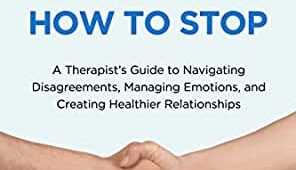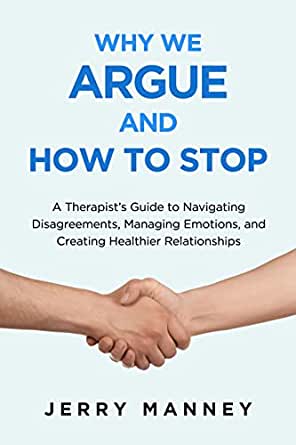You’re arguing again. Most likely the victim of your angry tirade is a co-worker, or a loved one.
It frustrates you that this person doesn’t change.
You are tired of saying the same thing over and over.
And how could this other person be a victim if they started the argument?
Why We Argue and How to Stop by Jerry Manney (178 pages) was sent to me by TCK Publishing. I have not received nor was I offered any inducement for this review.
The book gives some insight into HOW we get into arguments with other people, WHY we argue, and WHAT we can do to argue less, and cultivate greater peace of mind.
Whether you are by nature an argumentative person or argue out of righteous indignation, this book gives you the basic mental tools needed to stop.
My tendency toward arguing has been documented here. By reading “Why We Argue…” I hoped to control or at least slow this habit.
.
Know Thyself
The theme of this book is simple; Know Thyself. There is no “quick fix” solution to be had anywhere in its 178 pages. This is clear from the first chapter when the author instructs that to improve, it’s vital to keep a journal.
The Stoic philosophers Marcus Aurelius and Seneca both recommended the practice of journaling. I have covered the importance of journaling for behaviour change and mental health in this post.
The Big Idea that Mr. Manney puts forward in this book is that we need to know what feelings cause us to argue and how to regulate them.
This book definitely does not teach HOW to win the arguments you get into.
Chapters
There are eleven chapters and a “Further Reading” section. The chapters start with the premise of “Know Thyself” and proceed through various mental models on how to control the compulsion to argue.
- Why We Argue
- Put The Brakes on Heated Arguments
- Try Different Not Harder
- You Don’t Have to Invite Yourself (or others) To Arguments
- Get Your Concerns Really Heard
- Listen To Learn – Seek Common Ground
- You Don’t Have to Keep Arguing With Yourself
- Practice Makes Progress
- Children and Teens
10. What to Do When You Need More Help
11. Keep Things in Perspective
12. Further Readings
Best of Book
1. The book should be titled “Why Do I Argue and How Can I Stop?” The lesson is that we all have triggers that get us into arguments. We argue most when we’re trying to change the thinking or behaviour of someone else. That is a problem.
“The only people with whom you should try to get even are those who have helped you.”
Jerry Manney
The author states, “By focusing on what you can change – your response – instead of reacting to what you cannot change – how others act – you are taking two steps forward.”
2. What we can learn is that by holding on to resentments from previous confrontations, we re-experience the emotions that act as fuel for the next argument. The urge to “get even” after losing an argument needs to be squashed.
“The only people with whom you should try to get even are those who have helped you.”
3. A useful anagram that teaches when to walk away from an argument is:
H – Hungry
A – Angry
L – Lonely
T – Tired
If one or all these factors come into play, it is likely that even a mild disagreement can turn into a full-blown argument. It was eye-opening to learn that even licensed therapists can lose their tempers and raise their voices when arguing with family or friends.
4. This book also has a self-questionnaire so you can learn your triggers. I also found the questionnaire at JerryManney.com.
5. Not all arguments end with the exchange of heated words. Sometimes, they end in physical abuse. There is a list of resources that the reader can use if they are abused or if substance abuse is a major factor in the relationship.
Criticism
- Repetitive. At only 178 pages, it’s discouraging to find that the book repeats itself so often. Anyone reading it will find that “Why We Argue and How To Stop” should have been a useful, concise post or article.
- The storytelling is underdeveloped. This is not a textbook – I hope – but in some parts, it reads like one.
- Mr. Massey puts in numerous examples of how avoiding arguments might be possible under various circumstances, but here again, the weakness of the storytelling prevents my emotional connection to the case studies. While I’m usually difficult to connect with on an emotional level, I doubt this problem will be unique to me.
Conclusion
Keep an Argument Journal. Without some way to record goals and progress, you’ll never know where, when, or if you are improving.
Take the self-questionnaire to learn your triggers for arguments. Without knowledge of what sets you off, you’ll keep arguing over the same thing repeatedly.
You can buy Why We Argue and How To Stop, here. This is not an affiliate link.


Speak Your Mind